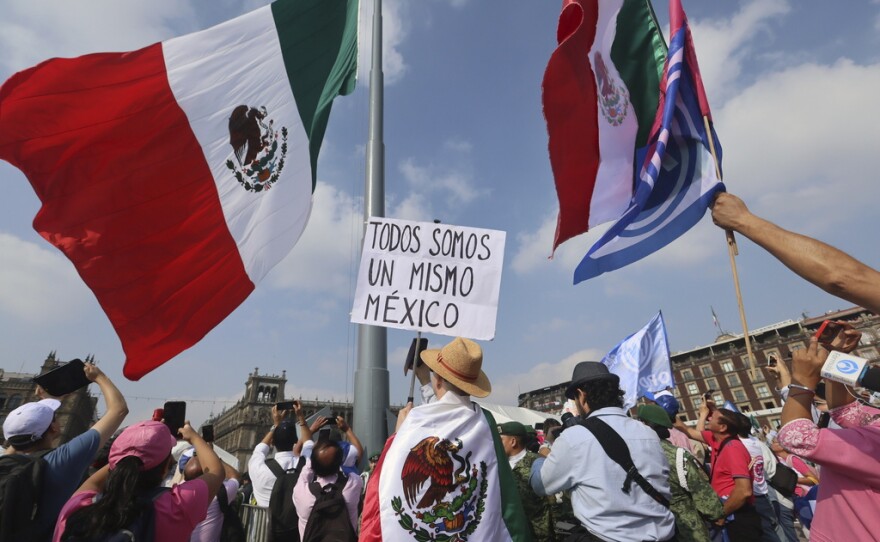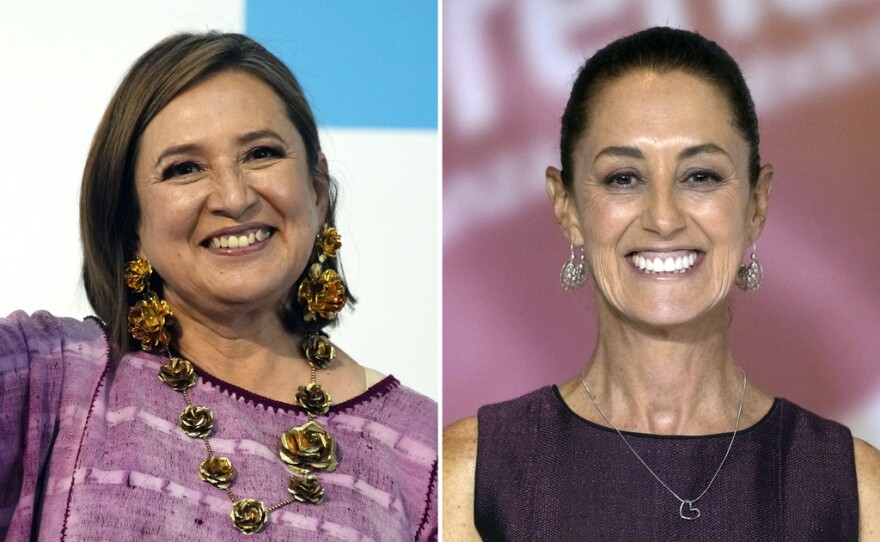Mexico’s presidential elections are Sunday. And, because both leading candidates are women, the country is likely to elect a first woman president before the United States.
This historic election also has more than 20,000 positions in state and local governments up for grabs, making this contest the largest in Mexico’s history.
The two leading presidential candidates are Claudia Sheinbaum and Xóchtil Gálvez.
Their campaigns have as much to do with the current president, Andres Manuel López Obrador (commonly known as AMLO), as they do about their individual candidacies.
In Sheinbaum’s case, she hopes to find success by leveraging López Obrador’s popularity.
“The word she defines herself with is 'continuity,'” said Kenia Zamarripa, vice president of the San Diego Regional Chamber of Commerce.
By continuity, she means a continuation of López Obrador’s social programs. This includes the popular cash handouts to some of Mexico’s poorest residents.
On the other hand, Gálvez is positioning herself as the preferred candidate of people who dislike López Obrador’s policies.
“We have a reactionary candidate with Xóchitl Gálvez who stands pretty much against everything López Obrador has been doing for the last six years,” said Alejandro Sánchez Flores, a policy analyst.
KPBS spoke with several experts about Sunday’s elections. And we’ve compiled a list of the topics voters should keep in mind as they head to the polls.
Low voter turnout and political apathy
Baja California had Mexico’s lowest voter turnout rate during the last election.
“It’s a combination of factors, but principally it is apathy,” said Sánchez Flores.
Sanchez has traveled throughout Baja California to organize support for expanding rights to the LGBTQ+ community. Although many people support the cause, most young people he spoke to said they have no trust in the system.
“People think candidates don’t represent their interests, that their votes don’t make a difference and that the system is corrupt,” he said.
The candidates’ performance in recent presidential debates haven’t helped the situation, according to Zamarripa.
“They spend most of the time on debates going after each other, going after family members and not as much time on proposals or responding to key questions on the issues,” she said.

Election violence
In Mexico, 23 political candidates have been killed before the election, according to media reports.
“Being a candidate in Mexico is a high-risk position,” said Cecilia Farfán-Méndez, with the Institute on Global Conflict and Cooperation, UC San Diego.
Given this level of violence, experts are concerned that qualified candidates are choosing not to run for office.
The violence also sheds light on Mexico’s weak justice system — the majority of homicides in the country are not investigated or prosecuted.
“The common thread between all of this is impunity,” Sánchez Flores said. “There is rarely an investigation that finds a culprit to these crimes.”

First woman president?
One of the biggest questions heading into the election is whether electing a woman president will change the lives of women in Mexico.
“Is the election historic in the sense that Mexico most likely will have a female president, yes,” Farfán-Méndez said. “Does this mean that there’s going to be more attention to gender-based policies? I think the answer to that is probably no.”
Zamarripa said neither candidate has embraced Mexico’s feminist movement, and President López Obrador and Sheinbaum have criticized it.
“That is honestly frightening for the first female president to not believe in the feminist movement,” she said.
Violence against women, specifically femicides, is a particular topic of concern.
The López Obrador administration has cut budgets for domestic violence shelters and childcare subsidies, according to Farfán-Méndez.
Local issues
In Tijuana, public safety and infrastructure remain the top issues.
Lack of investment in Tijuana’s infrastructure is a contributing factor to long border wait times and cross-border sewage pollution.
“That lack of long-term planning that we unfortunately don’t have in Mexico is causing these problems,” Sánchez Flores said. “We don’t have a San Diego Association of Governments in Baja California that has this long-term vision of where we want to get to.”
In terms of violence, there also don’t seem to be long-term solutions to reducing Tijuana’s homicide rate.
Apart from fighting insecurity, the city also needs to fight against the perception of insecurity, Farfán-Méndez said.
That perception is fueled by media coverage that disproportionally focuses on crime stories.
“It’s also the narrative that we hear in the media, that the border is this place that is in perpetual collapse,” she said. “That doesn’t help anyone. That is not advancing solutions.”










